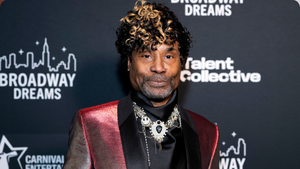My husband and I live in Nebraska and thought we had three boys until our second child was about 18-24 months old and began rifling through kitchen drawers for towels to fashion into long hair or to pin as a skirt. Everything about this child was feminine -- from the movies and cartoons she watched to the toys she played with. We say she was a walking Broadway show -- all pink, all Barbie, all musical, all the time. We knew virtually nothing about gender identity, so we assumed that if there was an international award for raising the gayest boy on the planet, we had the nomination locked up.
Over the next couple of years, as she began to articulate herself more and more, she started to talk not just about preferring "girl things" to "boy things," but about how she had a "girl brain" and a "girl heart and soul." She was adamant that she was really a girl on the inside. By the time she was about 4 years old, we were concerned about what all these declarations meant for our child, but had no idea where to turn. We were just quietly managing our day-to-day lives and I suppose secretly hoping she would "outgrow" it.
One Friday night in April 2007, I found myself watching an episode of ABC's 20/20. Barbara Walters was interviewing three families with transgender children. One child in particular mesmerized me. Her name is Jazz Jennings. Barbara interviewed Jazz and her family. It was as if they were videotaping our family. Our child was just like Jazz. I remember sobbing through the entire episode while experiencing a whole spectrum of emotions from an immense sense of relief that we weren't the only family on the planet on this journey to an intense despair that this experience was in fact very real and seemingly very permanent. The family sharing their story gave our family context and validation to our experiences and helped open us up to find better ways to support our child. It also gave us some desperately needed hope that things would be OK.
At one point, I remember listening as best I could as our child described her "girlness," and suddenly it clicked for me. The connection I made in that moment was to my dad. My dad was born in 1939 and was dyslexic. It was something he never really wanted his kids to know about, and he didn't tell us until I was in my late 20s. When he finally shared his story, he talked about trying to tell his teachers in early elementary school that he didn't see the letters and the words the way they told him he should. They summarily dismissed him. The adults in his life told him that he was lazy and stupid and if he tried harder he'd do better. He internalized that shame as a child and carried it with him throughout his life. As a society we didn't know anything about learning differences back then. Now we understand them better and no longer tell kids that their learning difference makes them "less than" or that it's their fault and something they can change. As I looked into Kate's eyes, I realized that I couldn't tell exactly what she was thinking and feeling and I couldn't know what was in her heart and soul. In the same way that we dismissed children's learning differences, the world was telling my child that she couldn't know what was true for her. Today, I watch her steadfastly blazing a trail in his honor.
As it turned out, Jazz and our trans daughter, Kate, were born only four days (yet more than 1,500 miles) apart. They actually had the opportunity to meet one another at a conference last year.
When Kate and Jazz transitioned, very few people even knew what the term transgender meant, and they knew even less about the journey of a transgender person (especially youth). Fast-forward a few years and now Jazz Jennings and her family have their own reality TV show, I Am Jazz, which airs on TLC. There are many transgender youth across our country. We don't have any official demographics measured, but based on anecdotal experience, there are thousands.
As a mother of three teenage children, I can't thank the Jennings family enough for their willingness to share their journey so publicly. I realize that the publicity and the show have undoubtedly had an impact on their family and on Jazz. However, Jazz being a publicly visible trans youth has made a huge impact in the lives of many transgender youth and their families across the country. Almost as important, she has made a difference in the public's perception of the appearance, experiences, and struggles of trans youth. There are more than a few people who have publicly criticized the Jennings family for publicizing their family story. My first response to the criticism is that it's no one else's business. They are a happy, loving family, and they should be free to make their own decisions. My second response is a plea for folks to think about the lives they've impacted by their decision to be public. I know firsthand that it made a positive impact on our family to hear their story. I've also heard from countless people that although they considered themselves an ally to the transgender community, they watch the show to learn about Jazz's experiences, thoughts, and feelings about things. Someone has to be first to share their story if we ever expect to learn anything new. So my hat is off to the Jennings family for the contribution they've collectively made to educate America about trans youth.
My hope for all trans youth is that we all take a moment to simply listen to them. They have so much to teach us if we would only take the time to listen to them with open hearts.
JONI WATKE STACY, Esq., is the president of PFLAG Omaha and on PFLAG's national board of directors. She lives in Nebraska with her family. Find out more about PFLAG here.




































































Charlie Kirk DID say stoning gay people was the 'perfect law' — and these other heinous quotes